|
|
|
Sort Order |
|
|
|
Items / Page
|
|
|
|
|
|
|
| Srl | Item |
| 1 |
ID:
147244
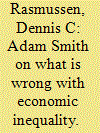

|
|
|
|
|
| Summary/Abstract |
This article explores Adam Smith's attitude toward economic inequality, as distinct from the problem of poverty, and argues that he regarded it as a double-edged sword. On the one hand, as has often been recognized, Smith saw a high degree of economic inequality as an inevitable result of a flourishing commercial society, and he considered a certain amount of such inequality to be positively useful as a means of encouraging productivity and bolstering political stability. On the other hand, it has seldom been noticed that Smith also expressed deep worries about some of the other effects of extreme economic inequality—worries that are, moreover, interestingly different from those that dominate contemporary discourse. In Smith's view, extreme economic inequality leads people to sympathize more fully and readily with the rich than the poor, and this distortion in our sympathies in turn undermines both morality and happiness.
|
|
|
|
|
|
|
|
|
|
|
|
|
|
|
|
| 2 |
ID:
118951


|
|
|
|
|
| Publication |
2013.
|
| Summary/Abstract |
This article focuses on Adam Smith's largely sympathetic response to the Rousseauian critique of the moral degeneracy of modern 'economic man'. It thus emphasises his philosophical ambivalence towards commercial society over the textbook IPE presentations which ascribe to him an almost wholly unreflexive market advocacy. In doing so it provides important methodological lessons for the study of Everyday IPE today. Arnaldo Momigliano has identified a decisive break in historical method in the eighteenth century, of which Smith and Rousseau were key exponents. However unwittingly, contemporary Everyday IPE scholars are the spiritual heirs of the eighteenth-century move from writing public histories of the state to writing private histories of unnamed individuals who embody the most recent phase of human sociability. The eighteenth-century economic man was conceptualised in relation to evolving forms of economic organisation, where the economy in turn was thought to reflect the prevailing system of 'manners'. Smith united with Rousseau in the belief that their society's bourgeois politeness allowed materialist ideologies to corrupt the moral autonomy of the individual. The historical method underpinning such concerns also allows Everyday IPE scholars to ground similarly-styled attempts to understand threats to moral autonomy arising from the struggle over economic surplus today.
|
|
|
|
|
|
|
|
|
|
|
|
|
|
|
|
| 3 |
ID:
126322
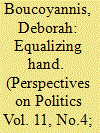

|
|
|
|
|
| Publication |
2013.
|
| Summary/Abstract |
That the market economy inevitably leads to inequality is widely accepted today, with disagreement confined to the desirability of redistributive action, its extent, and the role of government in the process. The canonical text of liberal political economy, Adam Smith's Wealth of Nations, is assumed even in the most progressive interpretations to accept inequality, rationalized as the inevitable trade-off for increasing prosperity compared to less developed but more equal economies. I argue instead that Smith's system, if fully implemented, would not allow steep inequalities to arise. In Smith, profits should be low and labor wages high, legislation in favor of the worker is "always just and equitable," land should be distributed widely and evenly, inheritance laws liberalized, taxation can be high if it is equitable, and the science of the legislator is necessary to put the system in motion and keep it aligned. Market economies are made in Smith's system. Political theorists and economists have highlighted some of these points, but the counterfactual "what would the distribution of wealth be if all the building blocks were ever in place?" has not been posed. Doing so encourages us to question why steep inequality is accepted as a fact, instead of a pathology that the market economy was not supposed to generate in the first place.
|
|
|
|
|
|
|
|
|
|
|
|
|
|
|
|
| 4 |
ID:
116887


|
|
|
|
|
| Publication |
2012.
|
| Summary/Abstract |
Friedrich List's National System of Political Economy continues to be positively received in ipe, where it is treated as a seminal text in development theory. Only a handful of ipe scholars have questioned the specific history of economic ideas through which List asserted the distinctiveness of his own position. They do so by showing that he deliberately put words into the mouths of his classical political economy predecessors to provide himself with something to argue against. His alleged authority on development issues rests in particular on purposefully caricaturing the arguments of Adam Smith. I use this article to suggest a plausible reconstruction of the route to List's Smith, one which recognises the possible intermediary influence of the early Dugald Stewart, John Ramsay McCulloch, the Earl of Lauderdale and Georg Sartorius. By following this complex trail to List's rather eccentric Smith historiography, it becomes possible to break down one of the most important oppositions in ipe pedagogy: that between List's National System and Smith's Wealth of Nations. It also becomes necessary to engage more circumspectly with List's history of economic ideas when searching for the origins of contemporary critically minded development theory.
|
|
|
|
|
|
|
|
|
|
|
|
|
|
|
|
| 5 |
ID:
084486
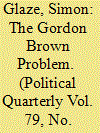

|
|
|
|
|
| Publication |
2008.
|
| Summary/Abstract |
As is well known, New Labour is often presented as an alternative to the conventional preferences of the left and right in British politics. Less commented upon is Gordon Brown's self-conscious appeal to the thought of Adam Smith in doing so. Brown claims to have rescued Smith from those on the right that interpret his 'invisible hand' metaphor from The Wealth of Nations to represent dogmatic advocacy of free markets. Rather than interrogate this view, Brown attempts to complement it with the 'helping hand' that Smith supposedly proffers in The Theory of Moral Sentiments, in order to stress New Labour's resolution of 'enterprise and fairness.' I argue that Brown instead reiterates the academically discredited Adam Smith Problem, in which the moral 'Smith' is deemed subordinate to the economic 'Smith,' and that his use of these erroneous characterisations highlights his commitment to a set of preferences usually associated with the right.
|
|
|
|
|
|
|
|
|
|
|
|
|
|
|
|
| 6 |
ID:
077418
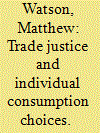

|
|
|
|
|
| Publication |
2007.
|
| Summary/Abstract |
A consistent theme of the existing literature is that fair trade consumption practices represent acts of justice. In this article I investigate such an equation from the perspective of the moral theory of Adam Smith. Smith explains the development of moral sensibilities via an imaginative act he calls `sympathy'. For Smith, justice prevails in interpersonal relationships in which the potential for one person to do harm to another is ruled out because their respective imaginations are in perfect accord, thus creating a situation of mutual sympathy. I advance two main conclusions. First, I argue that fair trade consumption is undoubtedly a moral act in the manner described by Smith, as it involves consumers responding to fair trade campaigns in order to trigger their moral sensibilities through exercising their imaginative faculties. Second, though, I argue that fair trade consumption is not specifically a moral act of justice in the manner described by Smith. The structure of fair trade invites the First World consumer to display sympathy for the Third World producer, but it provides no means for that sympathy to be reciprocated. As such, instances of genuine mutual sympathy do not arise. From a Smithian perspective, fair trade consumption practices are an act of beneficence rather than an act of justice. They thereby reside in the realm of private virtue rather than the realm of public duty, with significant implications for the way in which trade justice is conceptualized and studied in IPE
|
|
|
|
|
|
|
|
|
|
|
|
|
|
|
|
| 7 |
ID:
133028
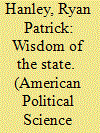

|
|
|
|
|
| Publication |
2014.
|
| Summary/Abstract |
Adam Smith's engagement with China and Tartary is a central yet underappreciated element of his economic and political thought. This article reconstructs this engagement and demonstrates its broader significance, arguing that it focuses on three themes: the economic institutions that promote domestic growth in a manner that alleviates the material conditions of the poorest, the social and political conditions that minimize the dependence of the poor on the wealthy, and the ethical values and civic institutions that guarantee the existential survival of the state. This treatment is significant for three reasons: It offers useful insight into the contested issue of Smith's conception of legitimate state action; it clarifies Smith's vision of a commercial order that promotes human dignity; and it reveals the depth of his participation in a specific contextual debate.
|
|
|
|
|
|
|
|
|
|
|
|
|
|
|
|
|
|
|
|
|